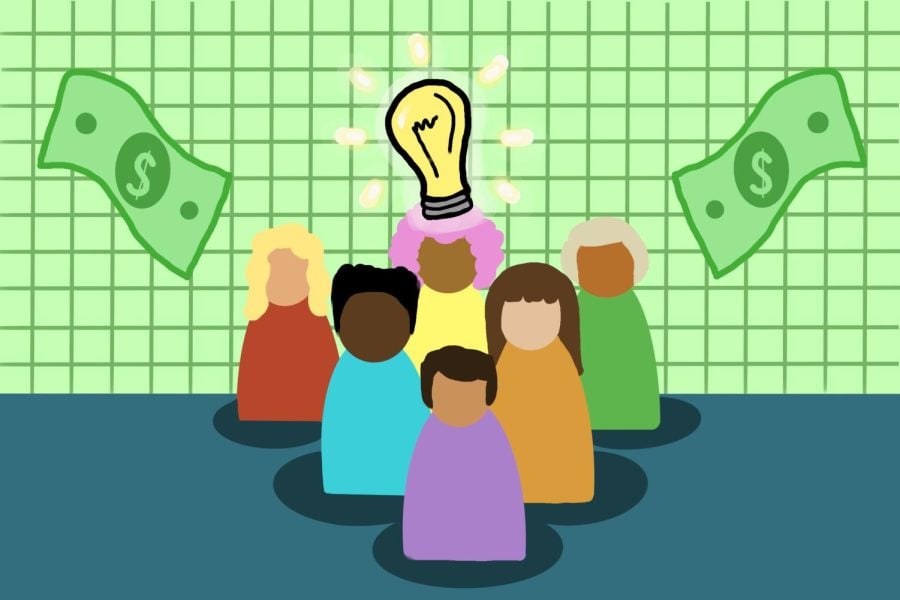‘Democracy working in action’: Evanston, NU collaborate on participatory budgeting pilot program
Daily file illustration by Lily Ogburn
PB Evanston invites community members to develop proposals for their ideas and then allows the community to vote on how the money is spent, according to the program website.
April 18, 2023
Evanston received $43 million from the American Rescue Plan Act in 2021 and 2022 to respond to the COVID-19 pandemic. Hoping to identify areas of need, the city put $3 million toward a novel solution: participatory budgeting.
The program allows residents, with the support of city staff and volunteers, to submit their ideas for funding allocation to the city and develop some of them into policy proposals for citywide consideration on the ballot.
When SESP Prof. Matt Easterday heard about Evanston’s participatory budgeting, he thought the program would be the perfect opportunity for Northwestern researchers and students to study the process and contribute to the community.
Easterday said his team of researchers submitted an application to the city, which contracted them to help develop the program.
Sixth-year learning sciences Ph.D. candidate Kristine Lu, a researcher on Easterday’s team, studies democratic deliberation –– the process groups use to work on a shared political problem.
Lu said Evanston’s participatory budgeting allowed her to study the real-world applications of democratizing deliberation through designing and facilitating in-person meetings with residents.
“It has helped me see a lot of things that most people aren’t able to see, whether it’s researchers taking traditional political science methods or teachers who are trying to teach civic knowledge,” Lu said.
Another researcher in Easterday’s team, fourth-year technology and social behavior Ph.D. candidate Gus Umbelino, manages a database with information about residents who signed up to take part in participatory budgeting. He designs online forms to invite people to attend meetings and for them to submit their ideas for the budget.
Umbelino said the participatory budgeting program allows him to study how technology can support civic engagement, putting his skills in computer science and outreach to use for a real-world campaign.
From November to February, the city held 10 meetings for residents to discuss and submit their ideas for the budget. Participatory Budgeting Manager Matthew Ouren said the city has collected more than 1,200 ideas with the help of NU researchers and volunteers.
Ouren said the next step is for resident “budget delegates” to meet and select and develop ideas into proposals that will be on the ballot later this year.
Evanston resident Michelle Long said she first heard about participatory budgeting from her daughter, a sophomore at Evanston Township High School.
Long, a budget delegate on the Asian, South Asian and Pacific Islander American affinity committee, said her group is working on a proposal to build an Asian American cultural and arts center in Evanston.
“We’re asking for funding to have a standalone building to provide a space where Asian-identifying people can come to celebrate culture, learn (and) have a community,” Long said.
She added that participatory budgeting is an example of “democracy working in action.”
While School of Education and Social Policy researchers helped implement the process for Evanston’s participatory budgeting, other students worked on publicizing the program and facilitated events as a part of their coursework for the SESP Civic Engagement Certificate.
“It’s really important that the students are working on a real campaign in a real organization,” Easterday, an instructor in the certificate program, said. “It’s not something you can learn just by reading about it or doing exercises.”
SESP freshman Anusha Kumar said working on participatory budgeting has helped her get to know Evanston.
“As Northwestern students, we often feel very distant and not very connected to the community,” Kumar said. “I think the certificate is a great way to get involved in the community and start building those connections.”
The students in her class work in teams that organize events to promote participatory budgeting in the community, Kumar said.
Communication junior Jordan Muhammad, a student in the certificate program who uses ki/kis pronouns, said ki is excited about participatory budgeting because it empowers residents to make decisions for themselves.
A member of Fossil Free NU, Muhammad said ki has also been applying the skills, such as formatting meetings, that ki learned to the organization.
“It just makes me excited that I’m learning things that are being used in the field of community organizing,” Muhammad said. “I’m also thinking new things, like concepts, tools and skills, that I wouldn’t have had I not done the program.”
Leonard Lamkin, an Evanston resident for 30 years and a member of the participatory budgeting housing committee, said his committee is considering proposing rental assistance programs, including one that helps people aged 14 to 21 to find housing.
He said he appreciates the community partnership between NU and Evanston on participatory budgeting and would like to see the city incorporate that collaboration into its yearly budgeting process.
“It’s a learning process for the students, and it’s good because they’re providing extra research. They’re providing extra hands,” Lampkin said. “It’s what Northwestern should be doing, not just with this process, but with every process … in the city of Evanston.”
Email: caseyhe2026@u.northwestern.edu
Twitter: @caseeey_he
Related Stories:
— Here’s how Evanston has allocated $38 million of its ARPA funding over the last two years
— City Council discusses ARPA priorities, creates Participatory Budgeting Committee in special meeting



